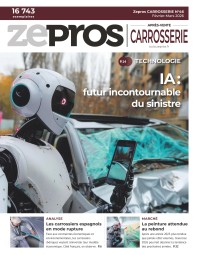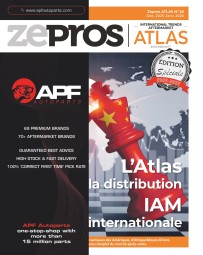
F. Delion, Renault : “Everything will depend on our ability to move forward faster than the independent aftermarket”

Current and future technological breakthroughs are real levers for the carmanufacturer's aftermarket, if the service to the customer is valued, according to François Delion. The Renault group's worldwide aftersales director delivers his vision of a strategy to conquer the field of aftersales in general and independent aftermarket in particular : the roadmap is written and is fully endorsed...
François Delion: This performance is the result of growth in all the showroom channels, with our accessory, workshop and wholesale sales. What is notable in the workshop channel is the increase in our service penetration rate in the 4 to 7 year old segment! We are promoting our Value+ alternative range, positioned between the original part and Motrio, and launched in spring 2021. It is aimed at Renault vehicles over 5 years old and Dacia models over 4 years old, and enables us to provide a service in our own-make workshops that is perfectly suited to the needs of clients looking for a competitive price range while remaining within a manufacturer environment. We have also strengthened the maintenance contracts we offer at vehicle sale, but have also started to transfer these contract mechanisms with all the appropriate financial arrangements to second-hand vehicles. Mechanically, we are increasing our vehicle trade-in rate, which in particular feeds our refurbishment centres (the Refactory concept already deployed in France and Spain). The more the residual value of the vehicle increases, the more inclined our clients are to renew their maintenance contract on their used vehicle. We intend to take full advantage of this opportunity.
F. D.: The building blocks are there, and the project is becoming more and more concrete between our brands, which are complementary in all aspects, from the product to the geographical location. We have launched a first experiment in Spain, a full-scale pilot, to obtain feedback and define the best "customer value" in terms of products and complete solutions. We are working with our digital start-up Kadensis, and together we will soon be able to announce the next steps in BtoB and BtoC. But we will act in a collegial way with our two other partners towards our respective networks. The story will be written in several stages, but it will make sense for each of the partners and each of our brands...
F. D.: Indeed, we are going to end the year with 15% growth in points of sale, compared to the 2000 recorded last year (between 5,000 and 7,000 in the long term). We are still fine-tuning our Master Franchise for this. But things are clear: we will never pursue quantity at the expense of quality. Nevertheless, we have a vocation to grow and reduce the variability of our network, with a strong presence in France, Italy, Spain and the whole of South-East Europe, but with room for improvement elsewhere. We need to strengthen our presence in the countries of north-eastern Europe, North Africa and Turkey. We need to be much more prominent in Great Britain (less than 100 points of sale), and even in Germany where we are absent. Our formats are also evolving with Motrio Bodywork for example, using the leverage of our Ixell brand.
F. D.: It’s opportunity to seize, if they wish to penetrate this older vehicle market. The fleet is ageing, and the independent aftermarket is within reach. Motrio is the way to gain privileged access to this customer channel. And some have taken the plunge by investing in the banner. In the Adriatic region (Slovenia, Croatia, Serbia and the Balkans), which I managed until last year, more than 20% of Motrio garages were developed by local distributors. Everyone knows that after-sales is a major factor in the profitability of a dealership. Everyone is aware of the challenges ahead. In any case, the primary network knows that this multi-brand network does not conflict with them, but complements them.
We have all we need to reassert the value of manufacturer services
F. D.: We have announced 80 hubs by 2025 in France, but this is not necessarily a European strategy. Once again, we adapt to each market: in Spain, we have taken over the entire capillary distribution, with more than ten regional distribution centres scattered around the country, and we provide daily deliveries for the independent aftermarket, on behalf of the dealers. In Italy, the scheme is hybrid with an application in the (denser) north of the country similar to Spain, and dealer capillary logistics in the south. Everything depends on the expectations of independent repairers, our distributors' capacity... We are not ruling anything out. And we are not making anything mandatory either.
F. D. : Definitely vehicle connectivity! It is becoming massive, so much so that by 2030, 80% of our fleet will be sufficiently connected for us to carry out proactive and preventive maintenance. But it will be based on four families: tyres, batteries, oil, and brakes, via our myRenault and myDacia applications. We have European dealerships that are testing tools for receiving vehicles without seeing the client (digital appointment booking, additional operations, online payment and pick-up). Our ambition is to have 80% of the Renault G4 network (France, Spain, Italy and Germany) operational by the end of 2023. Connectivity is no longer a pipe dream. Everything will depend on us and our ability to move forward faster than the independent aftermarket, bearing in mind that we have a head start commercially with the mechanisms for selling new and used vehicles, and technologically with connectivity and electrification. And let's not forget that the maintenance of an electric vehicle is more competitive than that of a combustion vehicle, which gives us an additional advantage! If we play our cards right, we have all we need to reassert the value of manufacturer services...








